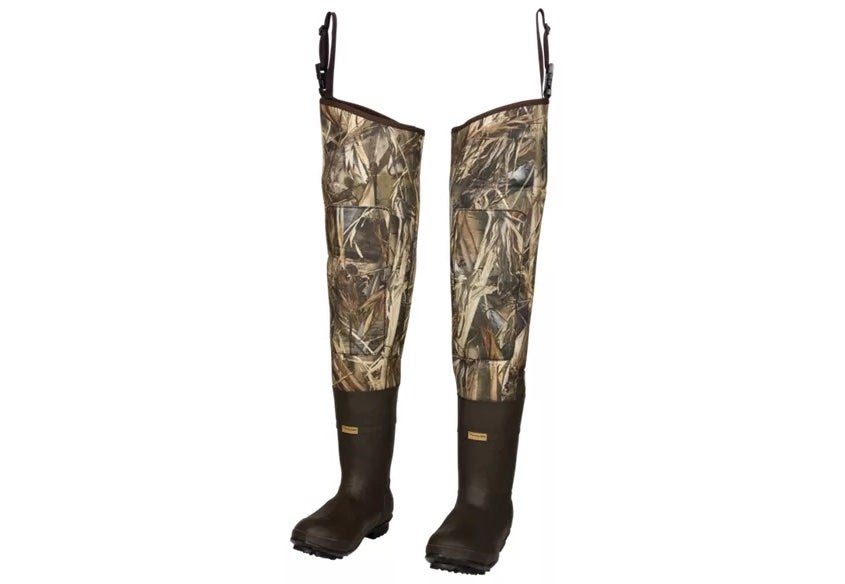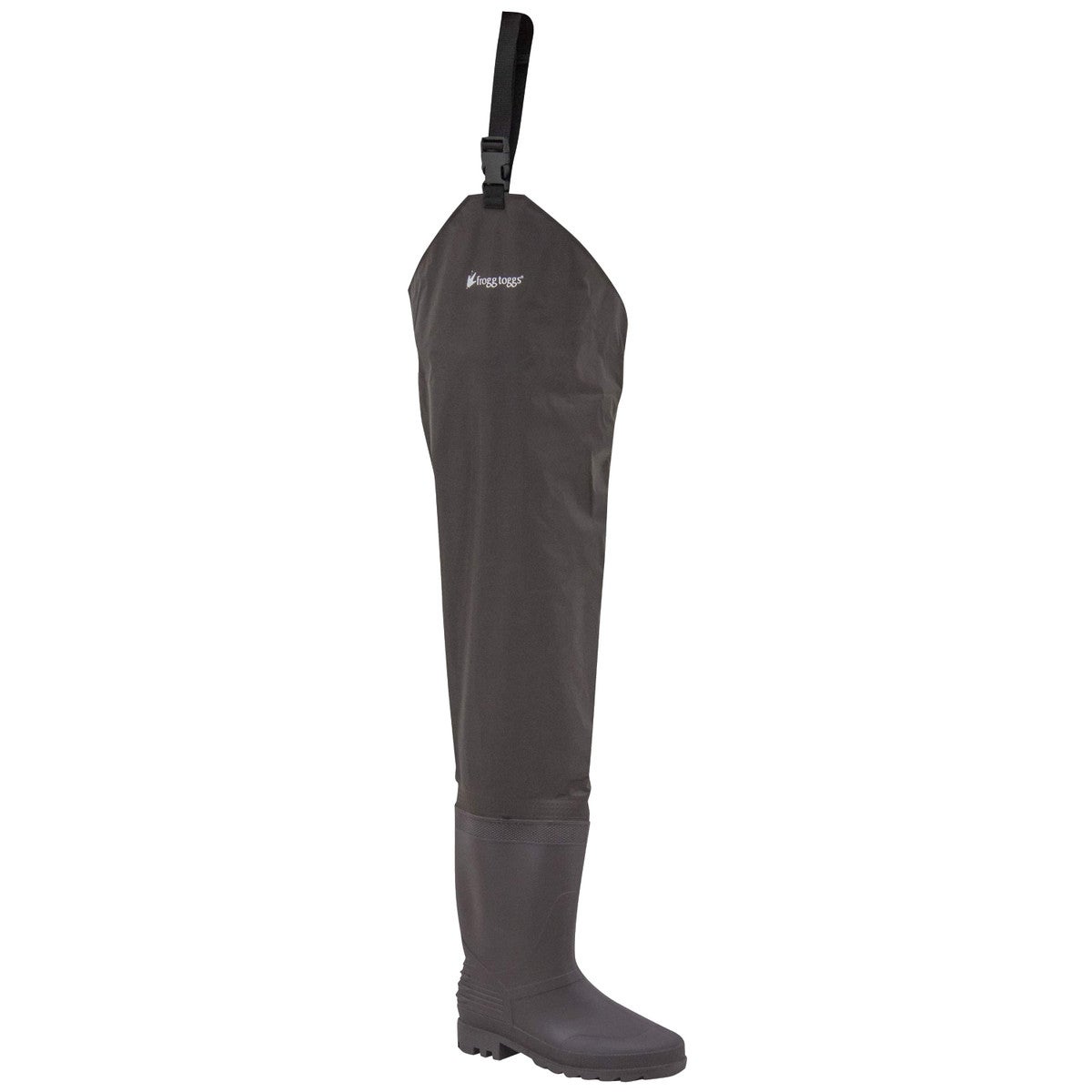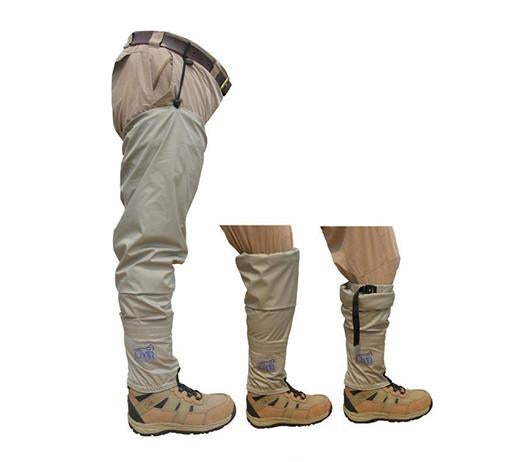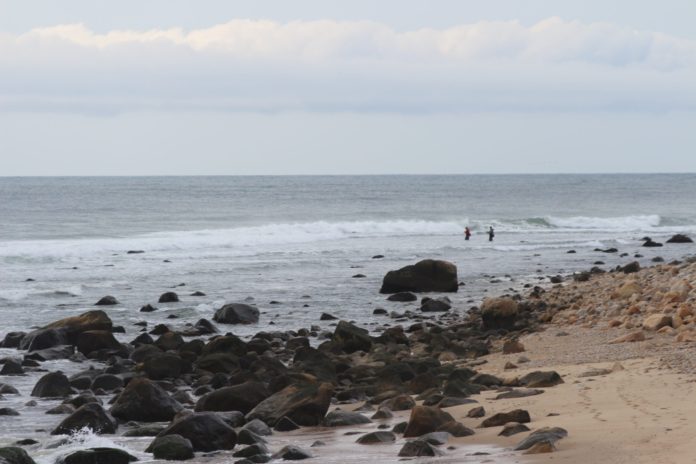| Best Rubber Hip Waders | Lacrosse Insulated Big Chief |
|
The basic build may be vintage, but modern materials are now involved, including an EVA footbed and 600-gram Thinsulate insulation. |
||
| Best Hunting Hip Waders |

|
Cabela’s Armor-Flex Lug Sole Hip Waders |
|
Made for walking in cold water, with thick neoprene, 800-gram Thinsulate insulation, and 8mm wool-felt midsoles for comfort. |
|
| Best Budget Hip Waders |

|
Rana II Bootfoot PVC |
|
These hip waders have taped seams to keep the water out and molded PVC boots for good support. |
It’s hard to imagine good fishing or waterfowling that doesn’t involve wet feet. I suppose you can fish from a dock, or maybe manage to get in and out of a jon boat with your shoes dry, but being able to walk comfortably through the water is a huge advantage. And if the water’s no more than a couple feet deep, you really don’t need waders that come up to your armpits. For an awful lot of what we anglers and hunters do, hip waders will suffice.
In fact, hip boots have some distinct advantages over chest waders. They often cost considerably less, since there’s less material involved. In warm weather, they’re more comfortable because they don’t wrap your midsection in waterproof fabric. They take up less space in storage and transport. And they’re much easier to put on and take off.
When to Wear Hip Waders
Certainly, hip waders are not for every situation. If you’re fly fishing a good-size river or casting in the surf of an ocean beach, you probably should be waterproof well above your waist. But if you’re chasing trout in small mountain streams (one of life’s great joys) or surfcasting away from the reach of the breaking waves, hip waders will keep you dry. And while a neoprene chest wader can provide a welcome layer of comfort on a raw November day, there are plenty of days during hunting season that would be more comfortable without it.
As you’ll see in the selection below, there are different styles of waders, from old-fashioned thigh-high rubber boots to light, breathable models meant to be worn with wading shoes. They all get the job done, so look for the features that are important to you. If you’ll be slogging through wetlands, you’ll probably want lug soles, but if you’re navigating slippery river rocks, felt will be a better choice. Get one-piece boots if you don’t want the fuss and cost of stocking-foots and wading shoes, but if you don’t mind owning and donning two pieces of gear, spring for the booties and enjoy the comfort and support. If you expect cold water and weather, heavy-duty rubber or neoprene boots might be your best choice, and they will also come in handy if you’re faced with a flooded basement. On the other hand, if your goal is spring and summer rock-hopping in brook trout country, you’ll probably like breathable waders best—or even wading pants, which offer more protection against getting wet than hip boots, but don’t cover up your core.
Old-School Rubber: Effective and Reliable
It seems quaint in this high-tech age, but companies still produce rubber duck waders, and for the same reasons as always: durability and absolute waterproofing. They’re kind of heavy and certainly not breathable, but they’ll make it possible for you to spend long periods in the wetlands, concentrating on the game. Use them as waders for fishing or as hunting waders; the rubber construction is great for suppressing scent.
Best Rubber Hip Boots: Lacrosse Insulated Big Chief

The 32″ LaCrosse Insulated Big Chief hip boots. Amazon
Check Price
Introduced in 1951, the Lacrosse Big Chief is a no-nonsense rubber hip boot. The tough rubber resists puncture, and puncture is about the only thing that could make these waders leak. The basic build may be vintage, but modern materials are now involved, including an EVA footbed and 600-gram Thinsulate insulation. The calf harness laces and snaps around your leg so the boot moves with you, and Lacrosse’s Air-Grip outsole sheds muck.
Neoprene: Snug and Warm
For many waterfowlers, neoprene hip boots are mandatory hunting equipment. The fabric fits snugly, affording freedom of movement and superb insulation, and is far lighter than rubber. Its spongy nature gives it a fair amount of puncture-resistance, and if you do poke a hole in them, well, some waterfowlers see patches on waders as a badge of honor.
Look for 3mm neoprene for mild weather use and 5mm for colder conditions. Neoprene hunting waders commonly have good insulation in the boots.
Best Neoprene Hunting Waders: Cabela’s 5mm Armor-Flex Lug Sole Hip Waders for Men

The Cabela’s 5mm Armor-Flex Lug Sole Hip Waders for Men. Cabelas
Check Price
These boots are made for walking in cold water, with thick neoprene, 800-gram Thinsulate insulation, and 8mm wool-felt midsoles for comfort. The Armor-Flex exterior, bonded and taped seams, and double-layer reinforced knees all work to prevent leaks. The TrueTimber DRT camo and air bob outsoles are good choices for waterfowling, and side-release snap buckles on the belt straps are easy to operate, even with cold, wet hands.
Why Shouldn’t Hip Waders Be Breathable?
Hip boots aren’t just hunting gear. A legion of anglers—freshwater and salt, fly and spin—need to be comfortable enough to spend hours in the water. Dry feet and legs are essential for spring and late fall fishing when water temps are in the fifties. Even in the summer, “wet wading” is only fun for so long. Rubber and neoprene are clammy and heavy in these circumstances. Breathable fabrics, on the other hand, feel terrific. If the water is chilly, you can layer underneath breathable waders quite effectively; on warm days, the moisture-wicking is essential for comfort.
There aren’t many breathable thigh-high fishing waders on the market, but the Chota Hippies are worth a look. Chota doesn’t even call them waders, but rather wading socks. They are stocking-foot style, meaning they have neoprene booties for the feet and must be worn with wading shoes. Fly-fishers who already own chest waders and wading boots are all set; those who don’t own them can buy relatively inexpensive wading shoes from Chota and other brands. By the way, as with all waders, Chota Hippes will keep ticks away from your skin, an important consideration in many locales.
Best Lightweight Breathable Wading Socks: Chota Hippies

Chota’s Hippies are cool, literally and figuratively. Wear them just below the knee, just above the knee, or all the way to your hip pockets using the knee-height cinch strap or the draw cord at the top. The socks are three-ply, 300-denier breathable material and the booties are made of 3mm neoprene, with gravel guards that fold down over the tops of your shoes.
Waders You Can Wear to Work?
Well, maybe not quite.
But if hip boots are oversized footwear, wading pants feel more like clothing, which is somehow more casual and less of a hassle. Unlike hip waders, wading pants actually do come all the way to your hips, and that’s a good thing. Most times that I’ve worn hip boots, I’ve managed to get wet above them, no matter how careful I was trying to be. Wading pants have you covered if you need to wade through water up to your backside, while keeping you in shirt-sleeve comfort from the waist up.
Like other models, the Redington Escape wading pants even have hip pockets, although they’re not waterproof. And like all waders, even the most clothing-like, these are meant to be worn over actual pants, not instead of them. Pull them on over a pair of lightweight hiking trousers or even joggers, step into your wading shoes, and wade comfortably all day.
Best Wading Pants: Redington Escape

These stocking-foot fishing waders feature four-ply breathable material all the way to the adjustable, hook-and-loop belt. The 3mm neoprene booties are warm enough for a brisk mountain stream, but not too warm. Built-in gravel guards keep sand and stones out of your wading shoes. You can carry things in the pockets, as long as you don’t mind if they get wet.
Hip Waders for the Money
There are many hunters and anglers whose need to walk in the water is occasional—who don’t plan on spending hour after hour, weekend after weekend in their hip boots. They see no need to invest in a high-end wader when a lower-priced model will meet their needs. Frankly, this is one of the best things about the whole hip waders category: you can acquire them for now-and-then use without spending a fortune.
Your local big box store will probably have acceptable options. Frog Toggs has become a popular brand among the outdoor recreation community, and its Rana II Bootfoot model will have you covered for everything from hunting and fishing to joining the community clean-up day at your local waterway. They come in lug or felt soles.

The Frogg Toggs Rana II Bootfoot PVC. Amazon
Check Price
Lighter than rubber, these nylon-reinforced PVC waders have taped seams to keep the water out and molded PVC boots for good support. The adjustable belt straps have quick-release snap buckles. The Rana II comes with lug soles for general terrain or felt soles for slippery riverbeds.
Some FAQs About Hip Waders
What is a good brand of waders?
Most people would agree that Simms, which makes all its waders at its factory in Bozeman, Montana, is the leading name in breathable waders. High quality waders are also produced by Patagonia, Orvis, Redington, and Frog Toggs. The Hodgman brand, which invented fishing waders in the 19th century, still makes a wide range of waders today.
What is the best material for hip waders?
Breathable fabric like GORE-TEX is the most comfortable and versatile material. Wearing layers of thermals and fleece underneath makes them warm enough for cold-weather use, while their perspiration-wicking qualities make them comfortable on hot days. Neoprene is a popular choice among waterfowl hunters, because it insulates very well and allows ample freedom of movement. Rubber or PVC is simple, fully waterproof, and generally resists punctures and tears well.
What size hip waders do I need?
Boot-foot waders are based on shoe size. If you expect to be wearing thick socks under them, you may want to go a size bigger. Stocking-foot waders tend to be sold in sizes like small, medium, and large, because you will supply the wading shoes. Make sure your shoes fit correctly over the neoprene booties. Wading boots that are a little too big aren’t ideal, but ones that are too small are pure misery.
Final Thoughts on Hip Waders
Sometimes, getting into a set of chest waders feels like an astronaut climbing into a space suit for a mission. When you need them, they’re great, but much hunting and fishing requires wading in water that’s only knee-deep. Hip boots will keep you dry without breaking the bank, and you can practically hop into or out of them with ease. Even if you already own chest waders, a pair of hippers is handy to have.
Credit: Source link































